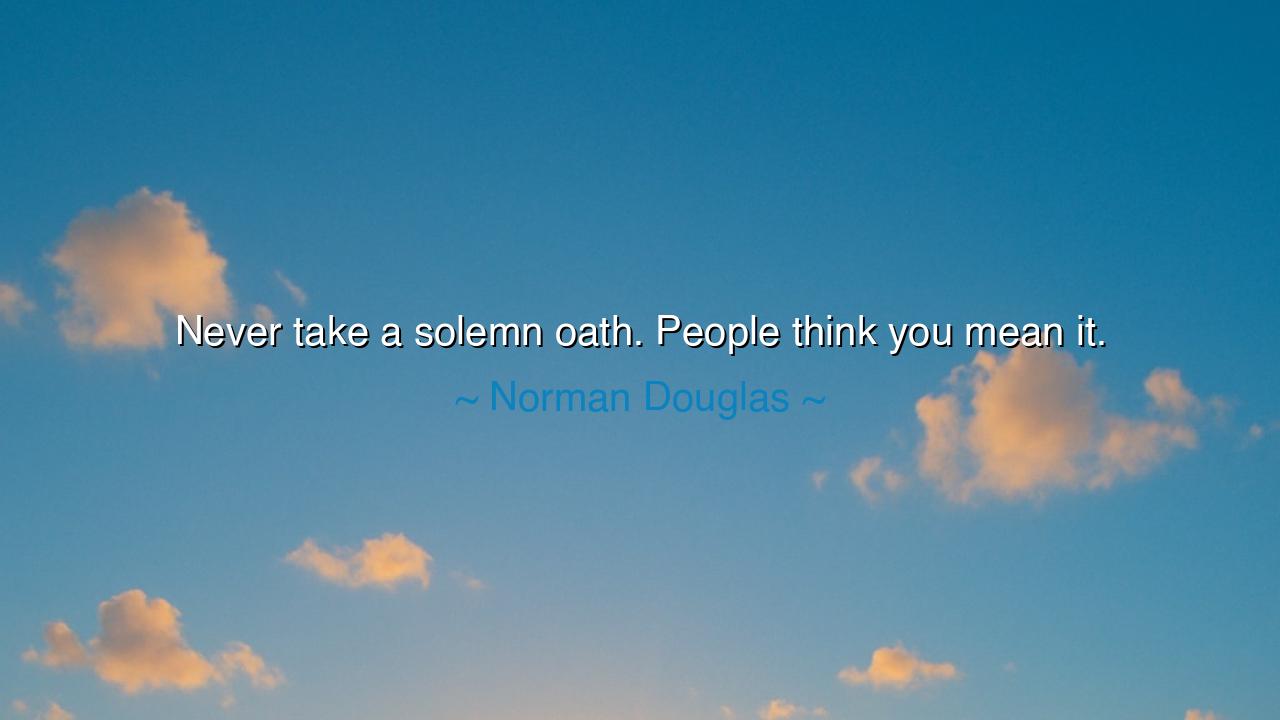
Never take a solemn oath. People think you mean it.






Hear this, O Seekers of Wisdom, for the words of Norman Douglas hold great weight: "Never take a solemn oath. People think you mean it." These words, spoken in jest yet rich with truth, urge us to consider the nature of our promises and the sacredness we attach to our words. Oaths, as Douglas suggests, are not mere expressions of intent; they are perceived by others as binding contracts, powerful and inviolable. And thus, when one utters such words—"I swear," "I vow"—the weight of those words can carry consequences far greater than one intends.
Let us reflect, O Seekers, upon the ancient practice of oaths. In times of old, oaths were not lightly spoken, for to swear upon one’s honor, or to invoke the gods as witness, was to place one's very soul in peril. The Greeks, with their gods watching from Olympus, understood the sacredness of promises. The Romans too, who prided themselves on their civic virtue, often took oaths—whether in battle, in politics, or in matters of loyalty. The famous Oath of the Horatii, sworn by the three Roman brothers, encapsulates the gravity of such commitments, for in their words lay not only their lives, but the fate of the Roman people. In these ancient traditions, breaking an oath was seen as a sin—an affront not only to those involved, but to the gods themselves.
Yet Douglas reminds us that in our modern age, where oaths are often made in the heat of the moment or under the pressure of expectation, the solemnity of the oath has begun to diminish. The truth of a person’s word is not always what it appears to be. People, in their earnestness, might utter promises with conviction and zeal, but time and circumstances often render those words empty. Just as the ancient Greek orator Demosthenes warned of the fickleness of human nature, so too does Douglas caution us about the fragility of promises.
It is no different in the world of politics, where oaths of office are taken with much ceremony. The leaders, as they raise their hands to the heavens or kiss sacred texts, vow to serve with integrity. Yet history is full of those who have broken these very oaths, driven by ambition, self-interest, or the tides of circumstance. Take, for example, the words of the English king Richard II, who promised to rule justly yet found his reign marred by betrayals and broken promises. The people, bound by their belief in the sacredness of his oaths, soon found themselves disillusioned, as the king’s actions did not match his solemn words.
There is also the great tradition of knights and warriors who swore oaths of chivalry—to uphold honor, defend the helpless, and protect their lands. Yet, as Sir Gawain and the Green Knight teaches us, even the noblest knights falter. Gawain, the very symbol of virtue, finds himself challenged by his own humanity when he breaks his oath, choosing self-preservation over honor. In the end, his confession and the acceptance of his flaws illuminate the deeper wisdom Douglas offers. The weight of oaths, the expectation that they must be kept at all costs, often leads to internal conflict and despair. We see the great warriors and politicians of history grappling with the consequences of their promises.
The true lesson of Douglas's words, O Seekers, is not to avoid commitment or responsibility, but rather to understand the power of our words and the expectations they create. The act of making an oath—whether personal or professional—can shape the world around us, for it carries an energy that others perceive and respond to. We must ask ourselves: Do we truly mean what we say when we speak such words? If not, we risk the disappointment and disillusionment of others when we inevitably fall short. Douglas’s wisdom calls us to be careful with our promises and to recognize that our words, once spoken, create ripples that extend far beyond our own intentions.
And so, the lesson we take from this is twofold. First, let us understand the weight of our words and promises. An oath is not a casual utterance, but a commitment that holds meaning in the eyes of those who hear it. Second, let us cultivate the integrity to align our actions with our promises, and if we are uncertain of our ability to keep them, let us refrain from making them at all. In this way, we protect ourselves from the consequences of broken words, and we preserve the sacredness of the promises we do make. Remember, O Seekers, that to speak with integrity is the highest form of honor, and to break a promise is to betray not only others, but also oneself. Therefore, tread carefully with your oaths, for the world takes them seriously.






AAdministratorAdministrator
Welcome, honored guests. Please leave a comment, we will respond soon